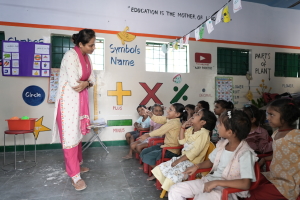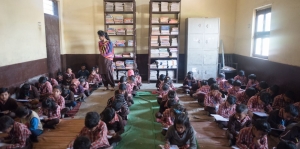
(Child Development Expert, Ex-UNICEF)
In this edition of The EDge, we interact with education expert Lata Menon to discuss the early childhood education landscape in India. We discuss the current ECE landscape in the country, the challenges that exist in the system and what is being done and could be done to tackle the said issues. Our dialogue encompasses an analysis of curriculum implementation challenges, the contrasting perceptions of government school education versus private establishments and a forward-looking discussion on charting the path ahead.
Lata Menon has worked in the field of child development and education for over 40 years in teaching, research and management of education programmes. She has been with UNICEF for 25 years supporting their education and child development programmes in Madhya Pradesh, Karnataka and Chhattisgarh, while also leading the organisation’s educational programmes in China and Ethiopia. After retiring as Chief of Education in UNICEF’s Ethiopia office, she has been working with the Government of Karnataka on early childhood development and primary education.
Q1. When talking to both teachers and parents, we found out that everyone has a different understanding of what constitutes good ECE. What do you think are the most important and non-negotiable ingredients that make quality ECE programmes?
Today, most state curricula are play based. Apart from this, other non- negotiable ingredients that should receive more attention would be:
- Strategic Approach to Multi-Age Classrooms: Our national guidelines and training materials fall short in addressing the complexities of teaching in multi-grade, multi-age classrooms. Before seeking solutions, we must first acknowledge this gap.
- Emphasis on Free Play: The often underrated component of free play in the curriculum deserves a dedicated focus. Well-executed free play cultivates choice, experimentation, problem-solving, creativity and crucial social interactions.
- Enhancing Teacher Competencies for Communication: The curriculum should actively support children’s communication skills, particularly for those from disadvantaged backgrounds. Teacher competencies in questioning techniques, fostering diverse answers and utilising conversations for observation and creative thought are non-negotiable competencies for teachers and need prioritised attention.
- Focus on Executive Functioning: Prioritise activities that develop children’s self-regulation, perseverance and cognitive-emotional skills. The ability to focus, resist distractions, and think before acting is a critical 21st-century skill.
- Emphasis on Informal Assessments: While assessments are crucial, striking the right balance is key. Informal evaluations require high competence and training, avoiding the pitfalls of formal examinations. Simple, doable evaluation methods should be non-negotiable competencies for teachers.
- Adequate Funding for Quality Programs: Implementing a quality programme necessitates sufficient funding. Running a zero-budget initiative, with materials crafted from waste and online training, is impractical. Government preschool programmes have faced declining funds, a concern that warrants more significant attention and protest.
Q2. The National Curriculum Framework for Foundational Years (NCF-FY) talks about the importance of a student’s mother tongue as the language of instruction. In our research, we found that almost half of all surveyed parents thought of English language teaching (and fluency) to be an important indicator of quality ECE. Keeping in mind that parents are one of the most important stakeholders when talking about ECE, how do we find a middle ground?
If parents only want English to be taught, without insisting on it being the medium of instruction, then we are on surer ground. It is not only the NCF, as all recent research has established that young children have an infinite capacity to learn to speak multiple languages but they need to attain proficiency in reading and writing in one language before they move to a second language.
Our experience in Karnataka has been that the demand for English medium education is so high, that government schools are seeing a steady erosion in enrollment as parents shift children into affordable private schools that offer this facility. This trend is unfortunate as the teachers in state-run schools are qualified and competent. So, finding a middle ground is very important.
Parents do place value on oral language fluency. A middle ground can be achieved by having a strong English programme in the preschool where students can learn oral language skills before they embark on reading and writing. Once students have learnt to speak and have a sufficient vocabulary in the language, they are better placed to learn to read and understand what they read. Our emphasis in the preschool years can be on fluency in oral communication, building the vocabulary, and phonemic awareness.
However, this is easier said than done. The majority of teachers at this level do not know the language much less speak it fluently. So, we will need to find other ways to introduce the language in the classroom, such as using audio and AV devices with the teacher being more of a facilitator. Audio is preferable as it also inculcates the habit of listening among children.
Q3. What are some systemic and programmatic shifts that would enable our curriculums and schools to have an ECE-FLN continuum and avoid downward extension of schooling to pre-primary years?
Talking about the ECE-FLN continuum, we are making three false assumptions that we need to correct:
- State curricula over emphasises on pre-literacy and pre-numeracy: They don’t, this is a false assumption. When we mention “downward extension,” we typically refer to an imbalanced emphasis on literacy and numeracy, sidelining other aspects and relying heavily on formal teaching methods. Most state curricula are crafted by experts with a nuanced understanding of child development. Our extensive knowledge on emergent literacy and foundational skills necessary for literacy and numeracy has evolved. We have broadened our perspective to include a diverse range of essential abilities vital for success in both educational and adult spheres—such as problem-solving skills and social intelligence, collectively known as 21st-century skills. This recognition has influenced curriculum planning, prompting the adjustment or imminent overhaul of state curricula to incorporate these multifaceted competencies. The challenge is with the curriculums adopted by affordable private school sector which over emphasise on these pre-literacy and pre-numeracy skills. This is a problem that we cannot ignore because it accommodates a large number of students.
- Improving the state curriculum will change the situation for all children: The prevailing notion that mass-based approaches equate to inferior quality, targeting the lowest common denominator, underscores a significant challenge. Merely having a superior government curriculum doesn’t assure its acceptance by parents or its adoption by private schools.
- Private sector cannot work hand-in-hand with the government: It’s crucial to recognise that private schools alleviate the burden on government institutions, enabling them to concentrate on students attending government schools. Additionally, we must concede that the government bears the responsibility for all its children and excellence should not be confined solely to government initiatives. The education sector thrives when all stakeholders actively contribute. Let’s move away from viewing curriculum development and state curriculum materials as exclusive domains of government agencies and programmes. Prior to initiating curriculum reforms, education departments should engage private school associations and schools. Consider involving reputable publishers, as many private schools adopt publisher-driven curricula. Align everyone on expected outcomes, learning methods, hands-on learning, and effective classroom organisation and management.
To solve for the ECE-FLN continuum, we need to keep the following in mind:
- Private entities and publishers should be permitted to develop their own programmes, fostering innovation while adhering to standardised benchmarks. Offering training and support to private establishments at a reasonable cost ensures credibility and guarantees that the curriculum is implemented as intended.
- Public perception of government schools and the definition of quality education must be addressed. Historically, our cultural perspective links education with literacy, numeracy and knowledge, viewing them as gateways to power and prestige. Success has traditionally been associated with individuals possessing these skills. Therefore, it’s understandable that aspiring parents seek these attributes for their children, including English education.
- As private schooling becomes more popular, for meeting parental aspirations intensively and competitively, there’s a crucial need to reshape public views of success. Connecting the dots between workplace skills and education is vital and should be emphasised in the curriculum framework. As states shape their frameworks, spotlighting the correlation between essential life skills requires widespread attention and political support.
Q4. Where do you think the ECE space is being directed towards? What are the potential research topics that could be explored in the ECE space?
Regarding a play-based learning curriculum, while most states already possess a robust framework, we can initiate this thorough review to identify and address key gaps. Yet, the theoretical aspect is the easier part. The transformation of a good curriculum into a great one lies in addressing implementation challenges, and this requires a long-term commitment.
To achieve this, we must accumulate evidence on effective practices, sourced from field-level experiences. Longitudinal studies involving a diverse group of teachers are essential to fine-tune our one-size-fits-all programme to adapt to real-world conditions. Training and mentoring groups of teachers across the state to reflect on and document successful practices, encouraging exchange and dialogue, and developing a comprehensive knowledge base from the field are critical steps.



